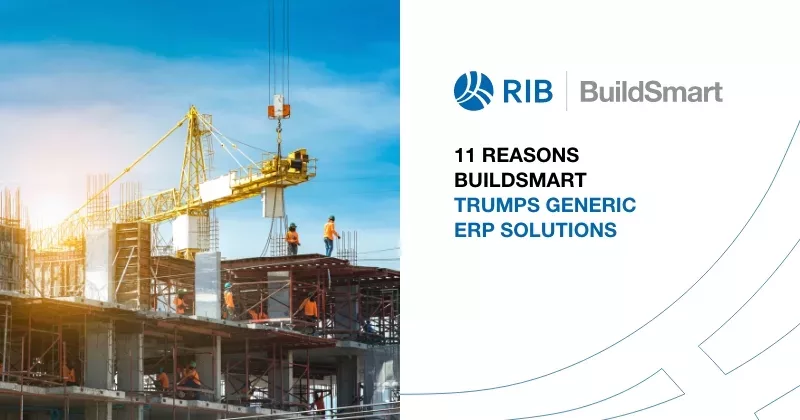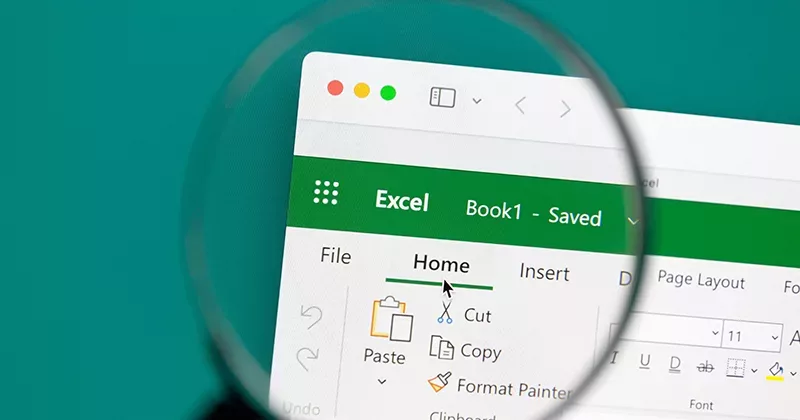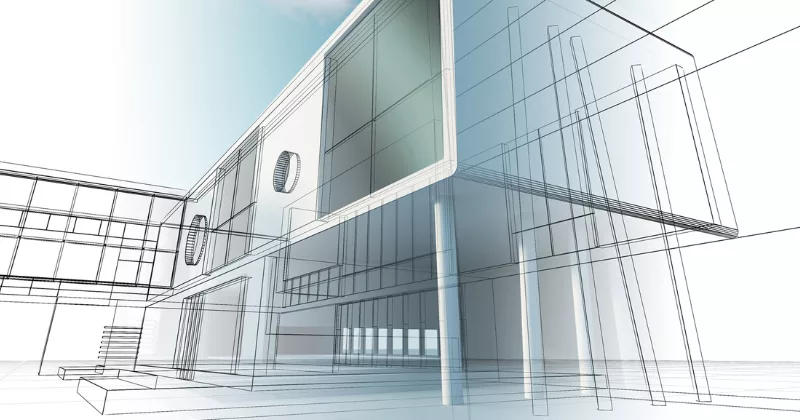10 mins read
How To Choose The Best Construction ERP Software

ERP systems have been widely used across all business sectors, but none have recognized the need for technological investment for sustainable growth more than the construction industry. The absolute necessity for improved efficiency, transparency of processes, and long-term cost management and control are recognized as pivotal factors in remaining at the pinnacle of the market in a fiercely competitive sector and operating on a significant scale of investment and profit.
If you are in the construction industry and considering investing in an enterprise resource planning solution (ERP), this article will give you significant strategic insight into what you need to know to make the right decisions.
Keep reading to learn about implementing ERP in the construction industry!
What Is Construction ERP Software?
Construction ERP software is an enterprise resource planning solution designed to meet the specific needs of the building sector. It uses centralized data and automation to help construction enterprises manage and optimize all their strategic and operational processes.
One of the core benefits of construction ERP is the wide range of features designed specifically for contractors and contract management. A comprehensive ERP will provide elements such as:
- Procurement and controls
- Specialized cost ledgers
- Payroll and labor costing
- Plant and equipment costing
- Contract cost reporting
- Construction business intelligence
- Document management
- Time and attendance systems
- Human resources management
- Enterprise Accounting
By consolidating the data from all the aforementioned areas and departments, businesses in the building sector can streamline their performance with a 360-degree view of their entire operations. This holistic approach boosts efficiency, transparency, and collaboration in construction projects, making them much more profitable by eliminating the guesswork from the decision-making process.
Benefits From Construction ERP Software
When taking the leap to implement construction software, you need to ensure you are choosing the right package from the right provider and that you will see a return on your investment. Whether to implement the software has largely become moot as its technological advances and efficiencies have become a differentiator in winning business and completing projects profitably.
Some of the benefits of these solutions are relatively obvious and will have been discussed at length in many articles and promotional literature, but here is a summary of the key benefits of using ERP for construction.
Centralized Data Management
Decentralized information and systems are a big challenge for organizations using data for strategic decision-making. A fully integrated construction ERP system is a software application that spans your entire business and provides a centralized database function linking all areas of the company into a single location. The data pertaining to your entire business will be handled by this system, bringing various positive changes:
- Redundant and duplicated data will be all but eradicated, freeing server and storage space.
- Licensing costs could be slashed as you won’t need to run multiple autonomous software packages for individual departments.
- You are also likely to reduce downtime due to software upgrades across multiple platforms as the system is set up to cover all departments, with upgrades and enhancements planned for and built into the software architecture.
Enhanced Knowledge
Construction enterprise management software is loaded with business intelligence and reporting functions that will pull data from all your departments across every business function. This will identify areas succeeding above and beyond expectations while highlighting any areas falling short. In simple terms, which processes and procedures are profitable, and where you are bleeding costs.
A typical example is in resource management. Whether you are renting plant equipment, or it is owned by you (or a combination of both), ensuring it is utilized across sites and to its maximum effectiveness and efficiency will directly impact your costs. Planning tools built into your software will allow easy scheduling to remove duplication of resources (one resource currently idle at one site while renting another to complete work on a different site). This example can be applied to all resources, including manpower, for example, and will begin delivering financial benefits across the board as soon as you are up and running.
Save Time And Money
How often have you wished you’d identified an issue much earlier and saved significant time and money? In the construction industry, you will all have experienced, or at least know, someone who has seen their entire margin all but wiped out by a simple error in estimating or cost assessment. Construction ERP software integrates information from every element of your business and provides up-to-the-minute real-time data and reporting. This can predict or catch things such as cost overruns and enable you to do something about it before it cripples your margins. Cash flow is king, and having milestone payments (valuations) flagged, documented, and submitted immediately could mean the difference between being in the red or the black.
On a somewhat lighter note, many real-time examples can be shared by companies who have adopted platforms where the integrated data identified significant duplication in cost and, in some cases, completely unnecessary expenditure. In one instance, it became apparent that one company (who shall remain nameless) was ordering enough tape measures against a particular project to set up their own commercial DIY business. The individual item costs were not significant enough to have been flagged, but the integrated system flagged them immediately. Such errors (or, at times, deliberate practices) can be eradicated by fully integrated systems.
Generalized ERP Software vs Construction ERP Software?

Many mid to large-sized corporations in the construction sector decide to invest in generalized solutions due to pricing convenience, more client reviews, or other factors. While specialized and generalized ERP software might offer similar features like financial management, HR, and supply chain operations, generalized solutions are not tailored to the building industry. Therefore, they lack key functionalities that enterprises need to stay competitive in this changing landscape.
While it is true that generalized ERPs are versatile and offer industry-specific features, they are not developed by construction experts, which makes it hard to keep up with the innovative functionalities constantly being developed by specialized ERPs. These solutions are tailored to solve the challenges and complexities construction enterprises face, helping them prevent costly errors, boosting collaboration, and enhancing productivity.
Below, we discuss why specialized construction ERP is better than traditional, standard solutions.
Contract management: Traditional ERP systems are product-based, whereas a construction ERP must be focused on Capital Asset contract management. The peculiar challenge for a construction ERP is managing a scope of work that can be fluid regarding a complex asset. Contract management must allow for multiple changes (sometimes hundreds of changes from the initial design) and be structured to handle workflow approvals, contract changes, and revisions.
Valuations within contract management: Unlike product-based systems, where there is often a defined cost base, the construction industry needs to measure and account for work completed (Valuations). This is commonly done on a progressive monthly pattern and forms the basis for payments being received or remitted to subcontractors. These valuations are often submitted by the Quantity Surveyor (physical measurement against the bill of quantities) and used to form the basis of applications for payment submitted to the client.
Cost control: The complexity of cost control in construction goes far beyond the abilities of a traditional ERP. A construction ERP must be able to handle diverse elements such as resource allocation (internal and external), payments on milestones, sub-contractor costs, and plant and equipment. The ability to set a budget for the project as a whole and adapt to changes are key, in addition to providing scheduled and up-to-date construction reports, business intelligence, and revision of the project forecast based on actual spending. This will assist in maintaining control of costs and, of course, margin.
Regulatory Compliance: The construction industry has many complex regulatory requirements. Specialized construction ERP offers automation features to track and manage safety requirements, building codes, and environmental regulations to ensure the project is 100% compliant. Standard ERP, on the other hand, might offer more basic compliance features that are not suited to the complexities of the building sector.
Procurement Management: Construction procurement is a complex process that includes bid management, vendor selection, and subcontractor agreements, making the standard procurement features provided by generalized ERP insufficient for success. Specialized ERP for construction is developed by experts with years of experience and a substantial level of awareness about how the different processes, like procurement, can be improved with the right technology.
How To Choose The Best Construction ERP Software

The best construction ERP for construction companies is the one that most aligns itself with how you wish to operate. In considering how to choose the ERP software to use, try answering these six questions:
1. Does the ERP software enable your teams to work together?
Most of us will remember our early days when whiteboards and yellow sticky notes were the primary planning and organization tools of the office. Everybody knew the system and its limitations, particularly if operating in a multi-team or multi-site environment. When introducing new systems, ensuring that they will be effective is paramount. After all, there is little point in having a new system that saves you 10 minutes if it adds 10 minutes to the workload of each member of your team. Where possible, trial/workshop a new system with a trusted core group to really ‘test drive’ the software’s collaborative features. This will likely highlight the pros, cons, and potential challenges of a wider rollout.
2. Do the benefits justify the cost?
Implementing ERP software for construction will impact time and money. Done correctly, however, the right software will more than pay for itself many times over in terms of cost savings and productivity when in operation. The options available on the market vary massively in price, so it is best to start by focusing on the features that will meet your specific needs. Then, compare the cost of obtaining and implementing that software against the cost or impact of not doing it. If the benefit is greater than the cost, the argument is all but settled. Be sure to consider all the elements of both cost and benefit, including time, errors, and opportunities.
3. Can you try it before you buy it?
Think of the process you went through to find office space or warehousing. All too often, the problems or flaws only become apparent after you have signed the lease and moved in. When selecting your construction ERP Software, you should have the opportunity to ‘try before you buy.’ This could be a workshop, a demo, or even a selection of training modules to let you experience how it operates firsthand. Consider how the software you are trying will match with your current team dynamics and how smoothly and swiftly they can adapt to it. Would it have any impact on other tools or systems you are using? When testing, think about what the product is actually delivering for you in real terms and value. Are the extras delivering value, or are they ‘add-ons’ for decoration rather than functionality? Check for intuitive functions that enable the team to execute common jobs without manual processing. Check also how the more advanced, non-day-to-day elements might work. Does the reporting fit your needs, and what elements can be customized?
4. Will your team feel the benefit and get on board?
Getting the maximum benefit in the shortest time will be a driver of the immediate value of your new ERP. Having the teams involved in the evaluation process is useful in getting ‘true’ feedback and having them feel engaged and part of the buy-in process. On the flip side, keep that trial to the appropriate length and keep it straightforward. As tempting as exploring downloads and side functions may be, maintain a strong focus on how it will fit into the workflow and core functions. A too-long or in-depth evaluation process can create confusion or even changes in workflow that are harder to reverse.
5. Will they use it?
An easy way to gauge the success of construction ERP software implementation is to check who uses it. If it is only the accountants, you may have missed some very important elements of the rollout and will not likely be getting the maximum benefit and value from your solution.
Like all changes and enhancements, planning is key. Consider the depth and scope of use required by each team member and plan for them to be trained specifically for those functions that will be used. If that is only one of the functions, such as answering questions or comments, for example, limit the training initially to that. Exploring the rest of the platform can come later as the system becomes embedded. Make sure your own workflows and processes are squared away. Identify any manual or bespoke workarounds occurring in the workplace before rolling out the new software.
After all, the implementation plan is likely to be based on documented procedures and workflows. There may be elements of an individual’s role that will change, or information or files may change location, so make sure they are aware and prepared. It goes without saying that integration with other software or systems will have been checked and checked again before launching.
6. Is it developed by experts?
Be sure your chosen ERP was designed for and by construction professionals. The challenges faced in managing buildings and construction are infinitely more complex than a manufacturer or a retail outlet might face. Make sure you select a product such as RIB BuildSmart that has full functionality and integrated modules for everything, including (but not limited to) budget, planning, financial management, inventory control, tenders, and, in fact, any other function or element of your end-to-end process that should be covered.
7. Who is using it in the global construction Industry?
ERP systems for construction need to be specifically developed for the industry to ensure that all the specific nuances are catered for. Many globally and regionally successful companies have integrated and developed their systems to deliver the maximum benefits from quantity takeoff and project planning right through to final certification, including detailed on-site management.
Now that you know what to look for and are getting to the point of choosing your construction ERP, why not learn from others’ mistakes (or leverage their experiences to your advantage, at least). Consider who is using the product you are considering putting in place and why. Does the provider you are considering have a successful track record of installing and embedding their software into successful construction firms, and what were their experiences? RIB’s construction software solutions have been designed and regularly enhanced from user experience and feedback for over two decades and are employed in some of the world’s most iconic builds. Make sure you have clear expectations on what you need and want your software to deliver, then cross reference that with what your competitors and those you aspire to compete with are leveraging. Never be afraid to ask others what their experience was.
8. Does it support agile decision-making?
Resource management has remained a significant challenge for construction professionals. The market-leading ERP solutions will give you access to and even highlight the right data at the time you need to review it. By that, we mean in real-time and in good time to make sensible and agile business decisions to utilize your resources more effectively. Better efficiency and real-time information also allow your business to be more accurate and detailed in forecasting, another area where large construction projects have been proven to shave significant costs in both actual resources and time by using the best tools available.
9. Will it facilitate fleet management?
More than a form of booking engine, fleet management for your construction company needs to be proactive in ensuring your very costly and ‘in demand’ equipment is not sitting idle or placed for use in locations where days are lost in moving them around different sites. Your construction ERP must employ an advanced fleet management section that provides fleet management and cost accounting as a given. It will also need to factor in preventative maintenance, looking after both periodic and scheduled maintenance while calculating, measuring, and managing all costs associated with the fleet.
In reality, a true, tried-and-tested ERP designed for the construction industry will do all of these and much more. Explore the options available, take guidance from the industry leaders in the field who have already adopted these systems and benefits, and let technology provide the additional support and efficiencies that are available.
Final Thoughts
Understanding how ERP software for construction can positively impact your business is broader and deeper than it might initially appear. These are not one-size-fits-all solutions; they need to be tailored to meet the specific needs and goals of companies looking to boost growth with the help of digital construction technologies. That said, implementing ERP in the construction industry doesn’t have to be a struggle when you partner with an industry leader.
RIB BuildSmart is an ERP platform with more than 20 years of experience in the industry. Our solution was developed and continuously updated by experts who have experienced the challenges and complexities of the building sector firsthand. This results in the development of innovative features that boost project performance, financial health, and resource allocation, among many other things.
If you can centralize your data, teams, and documentation in a single location and skyrocket your success, get a demo for RIB BuildSmart today!

Most Recent
10 mins read
11 mins read
11 mins read
10 mins read
Blog Categories

Ebook











